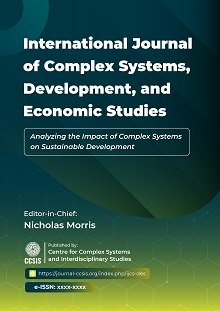Quick Menu
Contact Editor-in-Chief
Tools

| Title: | International Journal of Complex Systems, Development, and Economic Studies |
| Abbreviation: | IJCS-DES |
| e-ISSN | xxxx-xxxx |
| DOI Prefix: | xx.xxxxx |
| Editor in Chief: | Nicholas Morris, Scopus ID: 58289649100, La Trobe University, Melbourne, Australia |
| Managing Editor: | Jaka Aminata, Scopus ID: 57205338070, Universitas Diponegoro, Semarang, Indonesia |
| Publisher: | Centre for Complex Systems and Interdisciplinary Studies (CCSIS) |
| Frequency: | Semiannual, January & July |
The International Journal of Complex Systems, Development, and Economic Studies (IJCS-DES) is a peer-reviewed journal published by the Centre for Complex Systems and Interdisciplinary Studies (CCSIS). Serving as an interdisciplinary platform, it advances research that applies complex systems theory to socio-economic development, examining how dynamic interactions, emergent behaviors, and nonlinear feedback shape economic growth, policy outcomes, and sustainability challenges. By integrating systems thinking, computational modeling, and empirical analysis, the journal deepens our understanding of development processes and contributes to more resilient and adaptive economic strategies.
IJCS-DES focuses on the interdisciplinary application of complex systems theory to understand socio-economic development. It centers on how dynamic interactions, emergent behaviors, and nonlinear feedback drive economic growth, policy effectiveness, and sustainability challenges. The journal prioritizes research that integrates systems thinking, computational modeling, and empirical analysis to foster resilient and adaptive economic strategies.
IJCS-DES welcomes theoretical, methodological, and applied contributions addressing (but not limited to):
Complexity in Development Economics: Emergent poverty/inequality traps, non-equilibrium growth models, resilience of developing economies.
Sustainability & Adaptation: Climate-economy feedbacks, resource conflicts, transitions to low-carbon systems, socio-ecological resilience.
Policy & Governance: Nonlinear policy impacts, adaptive governance, systemic risks (financial, health, food), institutional evolution.
Methodological Innovations: Agent-based/network/system dynamics models, data-driven complexity analytics, hybrid empirical-computational approaches.
Socio-Economic Dynamics: Innovation ecosystems, urbanization patterns, labor market emergence, technology diffusion, behavioral economics in complex settings.
Excluded: Purely theoretical complex systems studies without socio-economic relevance; conventional econometric analyses lacking a systems perspective; non-empirical policy commentaries.
Quick Menu
Contact Editor-in-Chief
Tools
Published by: Centre for Complex Systems and Interdisciplinary Studies (CCSIS)
International Journal of Complex Systems, Development, and Economic Studies is planned to be indexed by:
International Virtual Office: Érables 94470 Boissy-Saint-Léger, France, Primary E-mail Contact: editorialboard@ccsis.info
 All publication from International Journal of Complex Systems, Development, and Economic Studies are licensed under a Creative Commons Attribution-ShareAlike 4.0 International License
All publication from International Journal of Complex Systems, Development, and Economic Studies are licensed under a Creative Commons Attribution-ShareAlike 4.0 International License
